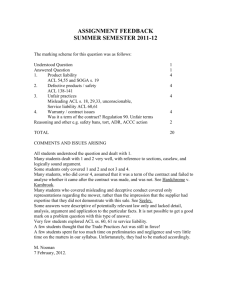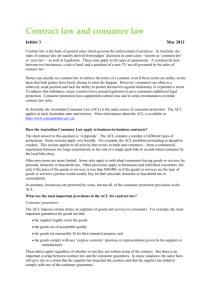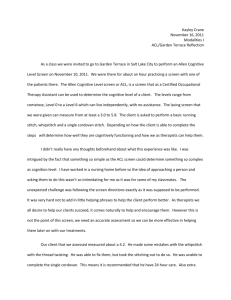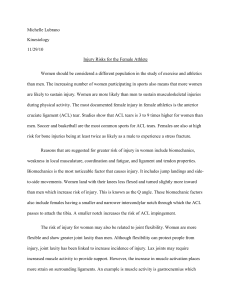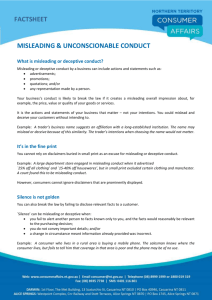Infolet 3 - Contract law and consumer law - Attorney
advertisement
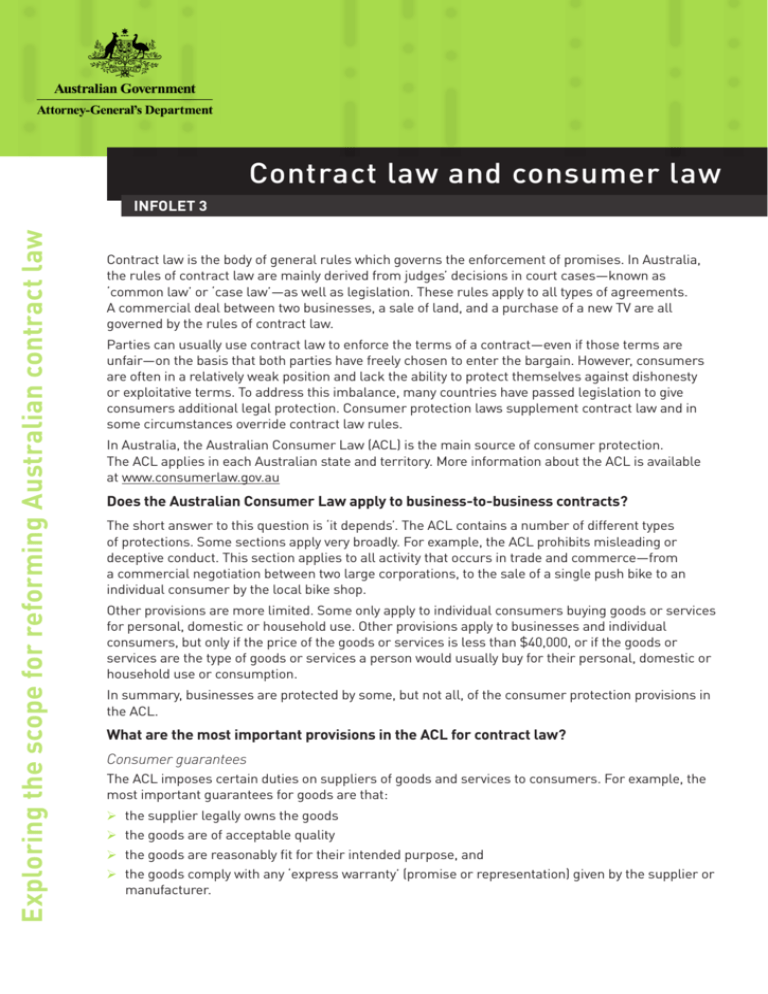
Contract law and consumer law Exploring the scope for reforming Australian contract law INFOLET 3 Contract law is the body of general rules which governs the enforcement of promises. In Australia, the rules of contract law are mainly derived from judges’ decisions in court cases—known as ‘common law’ or ‘case law’—as well as legislation. These rules apply to all types of agreements. A commercial deal between two businesses, a sale of land, and a purchase of a new TV are all governed by the rules of contract law. Parties can usually use contract law to enforce the terms of a contract—even if those terms are unfair—on the basis that both parties have freely chosen to enter the bargain. However, consumers are often in a relatively weak position and lack the ability to protect themselves against dishonesty or exploitative terms. To address this imbalance, many countries have passed legislation to give consumers additional legal protection. Consumer protection laws supplement contract law and in some circumstances override contract law rules. In Australia, the Australian Consumer Law (ACL) is the main source of consumer protection. The ACL applies in each Australian state and territory. More information about the ACL is available at www.consumerlaw.gov.au Does the Australian Consumer Law apply to business-to-business contracts? The short answer to this question is ‘it depends’. The ACL contains a number of different types of protections. Some sections apply very broadly. For example, the ACL prohibits misleading or deceptive conduct. This section applies to all activity that occurs in trade and commerce—from a commercial negotiation between two large corporations, to the sale of a single push bike to an individual consumer by the local bike shop. Other provisions are more limited. Some only apply to individual consumers buying goods or services for personal, domestic or household use. Other provisions apply to businesses and individual consumers, but only if the price of the goods or services is less than $40,000, or if the goods or services are the type of goods or services a person would usually buy for their personal, domestic or household use or consumption. In summary, businesses are protected by some, but not all, of the consumer protection provisions in the ACL. What are the most important provisions in the ACL for contract law? Consumer guarantees The ACL imposes certain duties on suppliers of goods and services to consumers. For example, the most important guarantees for goods are that: ¾¾ the supplier legally owns the goods ¾¾ the goods are of acceptable quality ¾¾ the goods are reasonably fit for their intended purpose, and ¾¾ the goods comply with any ‘express warranty’ (promise or representation) given by the supplier or manufacturer. Contract law and consumer law CONTINUED INFOLET 3 Exploring the scope for reforming Australian contract law These duties apply regardless of whether or not they are written terms of the contract. But there is an important overlap between contract law and the consumer guarantees. In many situations, the same facts will give rise to a claim that the supplier has breached the contract and that the supplier has failed to comply with one of the consumer guarantees. Misleading or deceptive conduct and unconscionability The ACL prohibits misleading and deceptive conduct in trade and commerce generally, not just in the consumer context. This prohibition is broad so that it can be raised in most situations involving a contractual dispute. It often plays a central role in commercial litigation. It is easier to make a case of misleading and deceptive conduct than to establish that the general contract law rules on misleading conduct and misrepresentation have been broken. The ACL also offers more flexible remedies. As a result, the general contract law rules in this area are now relatively little used. The ACL also prohibits unconscionable conduct. Transactions or dealings may be unconscionable when they involve serious misconduct or something clearly unfair and unreasonable. Conduct may also be unconscionable if it is particularly harsh or oppressive. It is behaviour that is substantially more than just hard commercial bargaining. The ACL provisions on unconscionable conduct are potentially broader than the equitable principle of unconscionability from case law. If a business engages in misleading, deceptive or unconscionable conduct in its dealings with another business or with a consumer, then that may affect the operation, validity or enforceability of any contract between the two parties. Unfair contract terms The ACL states that a term of a consumer contract is void if the term is unfair, and the contract is a standard form, non-negotiated contract. A ‘consumer contract’ is defined as a standard form contract with an individual for the supply of goods or services or the sale or grant of an interest in land where the purchase is wholly or predominantly for personal, domestic or household use or consumption. Business-to-business transactions are not covered by the ACL’s protection against unfair contract terms. How does the ACL affect potential contract law reform? The ACL is an important piece of legislation which provides protection to consumers. Provisions of the ACL have an important bearing on the outcome of many contractual disputes. Any reform of Australian contract law would have to take into account the interaction between contract law and consumer law. A number of academics have raised concerns that the ACL applies too broadly to business-to-business contracts and detracts from commercial parties’ freedom to contract. However, as there can be significant power imbalances in business-to-business contracts between larger and smaller businesses, it may be sensible to give protection to the latter under consumer protection law in some circumstances. Question for consideration How should the Australian Consumer Law be approached in any proposal for contract law reform? As we consider the future direction of Australian contract law, we want to take account of everyone’s experience and perspective. If you want to respond to the infolets, please email us at contractlaw@ag.gov.au. You can also access our discussion paper on reforming Australian contract law on the Attorney-General’s Department’s website at www.ag.gov.au/ Consultationsreformsandreviews/Pages/Review-of-Australian-Contract-Law.aspx. Have your say DISCLAIMER: This infolet does not provide legal or other professional advice, but contains general information about issues related to Australian contract law. The Australian Government does not accept responsibility for the accuracy and completeness of the information provided. Nor do the contents of this infolet commit the Australian Government to any particular course of action.
